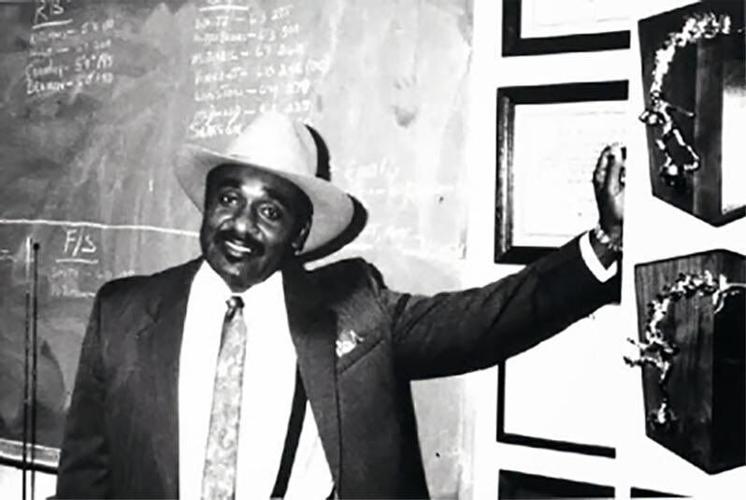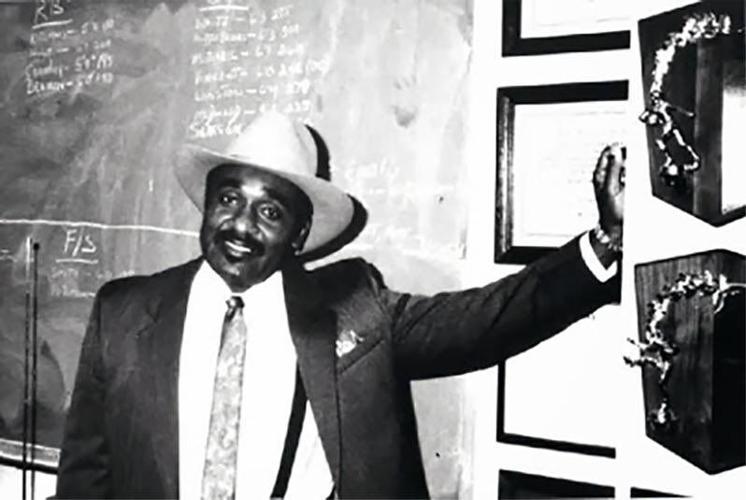Willie Totten called Jerry Rice to deliver the news Thursday morning, much like he had delivered so many passes to him four decades ago.
“Good morning,” Totten began.
“Hey, man, this is not a good morning,” Rice replied.
The news hit hard for Totten and Rice, who spent the next few minutes chatting about the life of Archie Cooley, the trailblazing offensive genius of a football coach who died Thursday morning.
Cooley, whose career was highlighted by record-shattering seasons at Mississippi Valley State, was 85.
Chances are, some of you reading this may not have ever heard of Cooley, the cowboy hat-wearing coach who was Southwestern Athletic Conference royalty in the 1980s.
He may have been before your time.
But truth be told, when it came to coaching football, Cooley was before everybody’s time.
Cooley’s football teams were putting up video game numbers before video games really became a thing.
When you picked up the newspaper on a fall Sunday morning in 1984 and saw the scores from the Mississippi Valley game the day before, you probably assumed it was a typo.
But those mind-boggling scores just kept popping up, one Saturday after another, as Cooley’s Delta Devils, featuring the oh-so-potent tandem of Rice (nicknamed “World”) and Totten (nicknamed “Satellite”), lit up scoreboards all across the SWAC and throughout the South:
• 86-0 over Kentucky State in the season opener.
• 77-15 a week later against Washburn.
• 49-32 over Jackson State in Week 3.
• 63-45 over Southern.
• 48-36 over Grambling.
And on and on it went for Cooley, the mastermind behind those juggernaut offenses with the wacky formations that had never been seen before.
His pass-happy offense earned Cooley the nickname “the Gunslinger.” The offense itself was called the “Satellite Express.”
Fans and defensive coordinators would look in bewilderment when they saw four wide receivers lined up on one side of the formation and one on the other. Much of what you see on the football field today is because of what Cooley implemented in the early ’80s.
“When he first came up with that offense, we thought he was crazy,” said Totten, now the quarterbacks coach at Southern University. “Nobody was doing that at the time. Everybody else was running the veer and trying to run the football. It just goes to show the type of coach he was. He was not afraid to think outside of the box.”
Mississippi Valley scored 49.2 points per game during that magical 1984 season, and the Devils averaged 55 points through the first nine games, all wins. To that point, Grambling's 12-point loss to Valley was the closest anyone came.
The 10th game of the season came against in-state rival Alcorn, which was also undefeated. The game was so highly anticipated that it was moved to a Sunday. The overflow crowd at Mississippi Veterans Memorial Stadium that day was 63,808 — but you can probably find twice as many people in Mississippi today who claim they were there for one of the most historic football games in the state’s history.
Tony Woolfolk played cornerback for Alcorn that season and still remembers preparing for Cooley’s offense. Well, actually, the preparation began way before that.
“It was the craziest offense we had ever played against,” Woolfolk said. “So we were looking at film and scouting them after every game from the beginning of the year. We would be in the dormitory all season, just trying to get clips to watch them.”
Marino Casem and Alcorn handed Cooley’s team its first loss of the season that day, a 42-28 defeat. Mississippi Valley’s season ended the next game with a loss to Louisiana Tech in the I-AA playoffs.
Before he coached at Valley, Cooley was an assistant at Alcorn and Tennessee State. After his time at Valley, he had stints at Arkansas-Pine Bluff, Norfolk State and Paul Quinn.
He was also offensive coordinator at Southern in 1992, and Casem, then the Jaguars' athletic director, recommended Cooley for the top job. (School president Delores Spikes and the board rejected him, citing concerns about the 41 NAIA violations UAPB racked up in Cooley's tenure, prompting Southern to ultimately settle on Pete Richardson.)
Cooley was inducted into the SWAC Hall of Fame in 2007, where he is enshrined with some of the other SWAC coaching legends from the conference’s glory days who preceded him in death.
Cooley may have been known for his signature cowboy hat.
“But he wore many hats for me,” Totten said, voice cracking as he spoke. “I look at him as a coach, a great leader, a father figure, a hero. He touched a lot of lives.”
When Totten wanted to quit the Valley football team his freshman year, Cooley convinced him not to.
Cooley’s words to Totten that day were a simple:
“Willie, you can do what you want to do. If you quit, you’d be quitting for the rest of your life.”
“That was very profound and it stuck with me forever,” Totten said.
Totten stuck it out and went on to rewrite the college record books, tossing passes to Rice, the greatest wide receiver who ever lived. They were so prolific that the stadium at Mississippi Valley is now called Rice-Totten Stadium. Media from all over the country swarmed to tiny Itta Bena, Mississippi, for that magical season in 1984.
“It gives me goosebumps just thinking about it,” Totten said. “Just having the opportunity in college to do something that nobody was doing and 40 years later, people are still talking about it. All the credit goes to coach Cooley.”
As it should.
The man in the cowboy hat, the Gunslinger, brought the World to Itta Bena, and he changed the game forever.


